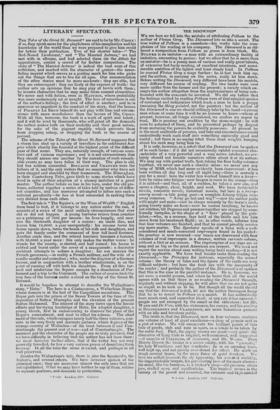LITERARY SPECTATOR.
THE Tales of the Great St. Bernard* are said to be by Mr. CROLY
if so, they speak more for the playfulness of his imagination and his knowledge of the world than we were prepared to give him credit for before their publication. Two of the shorter tales—" The
Red-Nosed Lieutenant," and "The Married Actress," we had met with in albums, and had selected them (in the Atlas) for
approbation, amidst a crowd of far feebler competitors. The story of " The Married Actress" is indeed the best even of this collection, and marked with the character of genius—the never fading imprint which serves as a guiding mark for him who picks out the things that are to live for all ages. Our commendation of the other stories must be more moderate : they are able, but they are extravagant : they are lively at the expense of truth : the author sets up opinions that he may play at bowls with them ; he invents characters that he may make them commit absurdities. i
We never met with fiction, even n MATURIN, where probability was more audaciously set at nought. The love of smartness is one of the author's failings ; the love of effect is another ; and he is moreover so impatient in the conduct of his story, that the heroes of PIGAULT LE BRUN himself do not play with time and circumstance with more nonchalance than the heroes of Ma. CROLY. With all this, however, the book is a work of spirit and talent ; and it will be read by thousands, who will grant all the demands the author makes both on their credulity and their good nature, for the sake of the piquant rapidity which prevents them from dropping asleep, or dropping the book in the course of perusal.
The scheme of the Tales of the Great St. Bernard supposes that a storm has shut up a variety of travellers in the celebrated hospice which charity has founded at the highest point of the difficult pass of that name. They are, naturally enough, of various countries and of various experience ; and it is not extraordinary that they should amuse one another by the narration of such remarkable events as may have fallen in their way, The plan is old, but has seldom succeeded. BOCCAC/0 and CHAUCER were the fathers of it, and the only writers that we remember who have not been clogged and shackled by their framework. The MissesiLaa, in their Canterbury Tales, gave birth to some stories which have lived in spite of their adoption of a clumsy imitation of a great master. The author before us has in his turn, under the old pretence, collected together a series of tales told by natives of different countries, and has moreover attempted to infuse into each a national peculiarity—he has at least succeeded in making them very distinct from each other.
The first tale is "The Squire's, or the Woes of Wealth :" English from head to foot, if it belongs to any nation under the sun, it consists of a series of the most unlikely circumstances that ever did or did not happen. A young barrister retires from practice on a patrimony of 500/. per annum : he lives happily, and marries the thirteenth daughter of a curate : an uncle dies, and leaves him 10,000/. a year unexpectedly: his income turns his house upside down, turns the heads of his wife and daughters, and puts the family under the command of four tall laced footmen.. Another ancle dies, and the retired barrister becomes a baronet, with 30,000/. a year more : this only makes the matter worse : he stands for the county, is elected, and half ruined : his house is robbed and burnt under the cover of a masquerade : a decorator architect attempts to seduce a daughter : his son marries the French governess,—in reality a French milliner, and the wife of a candle-snuffer and comedian ; who, under the disguise of a German hussar, and in conjunction with a brother whiskerando, is on the point of running off with both his daughters. From all this turmoil and misfortune the Squire escapes by a dissolution of Parliament and a trip to the Continent. The author of course finds the rosy face of the baron ot under a cloud on the top of the Great St. Bernard.
it would be hopeless to attempt to describe the Wallachian's story, "Hebe." The hero is a Cantacuzene, a Wallachian Boyar, whose domain is at the foot of the Carpathian mountains. This Boyar gets into the prison of the Seven Towers at the time of the deposition of Sultan Mustapha and the elevation of the present Sultan Mahmoud. The interest of the story turns upon the heroic efforts and the trying hardships of Hebe, his adopted daughter, a young Greek, first in endeavouring to discover the place of the Boyar's concealment, and next to effect his release. The chief merit of this tale, whicitoccupies nearly half the three volumes, consists in the very lively and accurate pictures which it gives of the strange country of Wallachia—of the tract between it and Constantinople the present seat of war—and of Constantinople. The manners and the character of the people are so truly pictured, that we have difficulty in believing that the author has not been there: we must however further allow, that if the writer has not very generally travelled, he has a very curious power of describing from hearsay. in all the tales the scene is varied, and perhaps in all Yell preserved.
Besides the Wallachian's tale, there is also the Spaniard's, the Italian's, and several others. We have however spoken of the principal ones ; they are moreover almost the only ones that are not republished. What we may have further to say of them, relates to separate portions, and descends to particulars.














 Previous page
Previous page